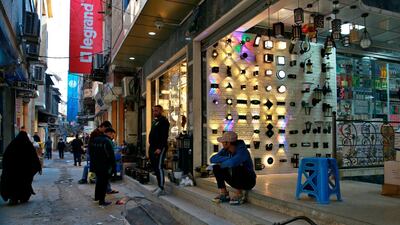Fiscal reforms in Iraq combined with the recent devaluation of the exchange rate are "critically important steps" that can help reduce large external and fiscal imbalances and stabilise the country’s economic, the International Monetary Fund said.
“The Covid-19 pandemic and the sharp decline in oil prices and output have aggravated Iraq’s economic vulnerabilities,” Tokhir Mirzoev, IMF mission chief for Iraq, said. “Severe fiscal financing constraints and challenges with meeting external and domestic payment obligations, including wages and pensions, necessitate a decisive recalibration of economic policies to maintain economic stability.”
The Washington-based lender welcomed the Iraq government’s plans to significantly increase targeted cash transfers to the poor as well as to enhance health-related spending to mitigate the impact of the Covid-19 crisis on the most vulnerable.
Faced with the twin shocks of dwindling oil revenue and the coronavirus-induced economic slowdown, Iraq devalued its currency by about 23 per cent against the US dollar on December 20, the first time the peg was adjusted since 2015.
The Central Bank of Iraq set the exchange rate at 1,450 dinars per dollar, from a peg of 1,182 dinars, for sales to the finance ministry. The dinar will be sold to the public at 1,470 and to other banks at 1,460.
"The structural distortions in the Iraqi economy are the ones that impoverished the public finances and restricted the ability of reform sought by the government and the Ministry of Finance," the central bank said. "Fiscal policy lagged behind in performing its roles, and monetary policy was preoccupied with repairing the outputs of confused fiscal policy."
Welcoming the draft 2021 budget, the IMF said continued reforms, including in structural areas, will be instrumental in cementing short-term gains and laying the ground for higher, job-rich and more inclusive growth.
"While providing relief from immediate financial tensions, the authorities' short-term plan will need to be followed up with further reforms, including deeper structural reforms, to strengthen economic resilience, create further fiscal space for critical reconstruction and social spending, and lay the ground for higher, job-rich and more inclusive medium-term growth," Mr Mirzoev added.
Last month, the World Bank said millions of Iraqis could be forced into poverty due to the twin shocks of the pandemic and the collapse of oil prices. Even in its "benign scenario", about 5.5 million Iraqis could be pushed into poverty, the Washington-based lender said.
Opec’s second-largest producer depends on oil revenue to meet 90 per cent of government expenditure, including $5 billion spent on salaries for public servants each month.
A white paper on economic reform submitted to parliament by Mustafa Al Kadhimi's government proposes slashing the bill for government salaries to 12.5 per cent of gross domestic product within three years, from the current 25 per cent. The paper also calls for a reduction in benefits and allowances as well as reforms to the pension system.
Recommendations include phasing out subsidies to critical sectors in Iraq's economy, notably power.
Iraq’s economy was forecast to shrink 12.1 per cent this year before the devaluation, the third-steepest contraction in the Arab world after Lebanon and Libya, according to the IMF.
Last month, Fitch Ratings said a 20 per cent devaluation of the Iraqi dinar would increase next year’s budgeted oil revenue in dinar terms by about 6 per cent of gross domestic product. However, a weaker dinar also means inflation in the country will rise as the cost of imports increases.
Iraq’s central bank said the depreciation would not be repeated as it would use foreign reserves to defend and stabilise the currency.
The exchange rate had become “a major obstacle” to the growth and development of the economy, the central bank said, prompting it to respond to the requirements of financing the budget at a rate that provides sufficient cover to the government’s needs.


